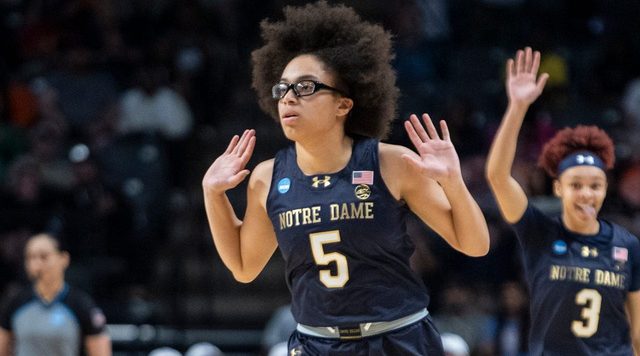Following a loss to TCU in the Sweet 16 on Saturday, Notre Dame star guard Olivia Miles said she was “leaning towards” declaring for the 2025 WNBA draft despite having another year of college eligibility.
It made sense. Miles was the projected No. 2 overall pick in the draft in two weeks. She would likely have been selected by the Seattle Storm, a franchise with four WNBA championships, where she would follow in the footsteps of Sue Bird.
Then, on Monday night, Miles suddenly changed course. ESPN reported the 22-year-old chose to forego the draft and enter the NCAA transfer portal. The 180-degree turn from a top prospect highlights the instability in women’s basketball, particularly in the transition from college to the pros.
Why Stay in College?
When Miles inevitably enters the 2026 WNBA draft, she may not be selected as high as she could have been this year. But she may get paid a lot more.
In October, the Women’s National Basketball Players Association opted out of its current collective bargaining agreement with the WNBA that expires after this season. The players are seeking a significant pay increase.
Nearly every player in the league will be a free agent next offseason in the hopes of signing a much larger contract once the league’s record-setting 11-year, $2.2 billion media-rights deal takes effect in 2026—every player except those on rookie contracts.
It’s unclear whether the CBA changes will affect rookie deals, but 2025 rookies are at risk of locking into some of the WNBA’s cheapest contracts until 2028. If Miles were selected with the No. 2 pick in this year’s draft, she would sign a four-year, $348,198 deal, an average annual value of $87,050, per Spotrac. The 2025 minimum salary is $66,079.
UConn star Paige Bueckers, who told ESPN last week that she will enter the 2025 draft, could have used the same reasoning to return to college. However, Bueckers is a special case, given her star power. Bueckers is already assured a spot in Unrivaled, the 3-on-3 professional basketball league that pays its players an average salary of around $220,000. She also has an equity stake in the league.
Miles is not assured a slot. She doesn’t have the same following as the rookies who made Unrivaled rosters this year (e.g., Angel Reese) and would need a standout 2025 season to make the 30-player league.
Why Transfer?
Miles’s decision was also surprising since she decided to enter the transfer portal rather than run it back in Notre Dame.
A few factors that could have influenced Miles’s decision:
- House v. NCAA settlement aftermath: The basketball programs at Notre Dame are prime candidates to be affected by the new revenue-sharing rules if it decides to delegate the majority of its funds to its prized football program.
- Personal brand building: Hannah Hidalgo, Miles’s backcourt partner, is the Fighting Irish’s best player. By transferring, Miles has the opportunity to raise her profile as another program’s top star—akin to Hailey Van Lith’s move to TCU.
- Championship dreams: Notre Dame will be a title contender next year, but Miles could still find a better opportunity. Perhaps a more prominent program losing its lead guard to the WNBA?
There may also be personal reasons that could have influenced Miles’s decision to leave South Bend. “I love college. I think I’ve outgrown it a little bit, though, so that makes my decision tougher to stay,” Miles said Saturday.







![[Subscription Customers Only] Jun 15, 2025; Seattle, Washington, USA; Botafogo owner John Textor inside the stadium before the match during a group stage match of the 2025 FIFA Club World Cup at Lumen Field.](https://frontofficesports.com/wp-content/uploads/2026/02/USATSI_26465842_168416386_lowres-scaled.jpg?quality=100&w=1024)
![[Subscription Customers Only] Jul 13, 2025; East Rutherford, New Jersey, USA; Chelsea FC midfielder Cole Palmer (10) celebrates winning the final of the 2025 FIFA Club World Cup at MetLife Stadium](https://frontofficesports.com/wp-content/uploads/2026/02/USATSI_26636703-scaled-e1770932227605.jpg?quality=100&w=1024)








